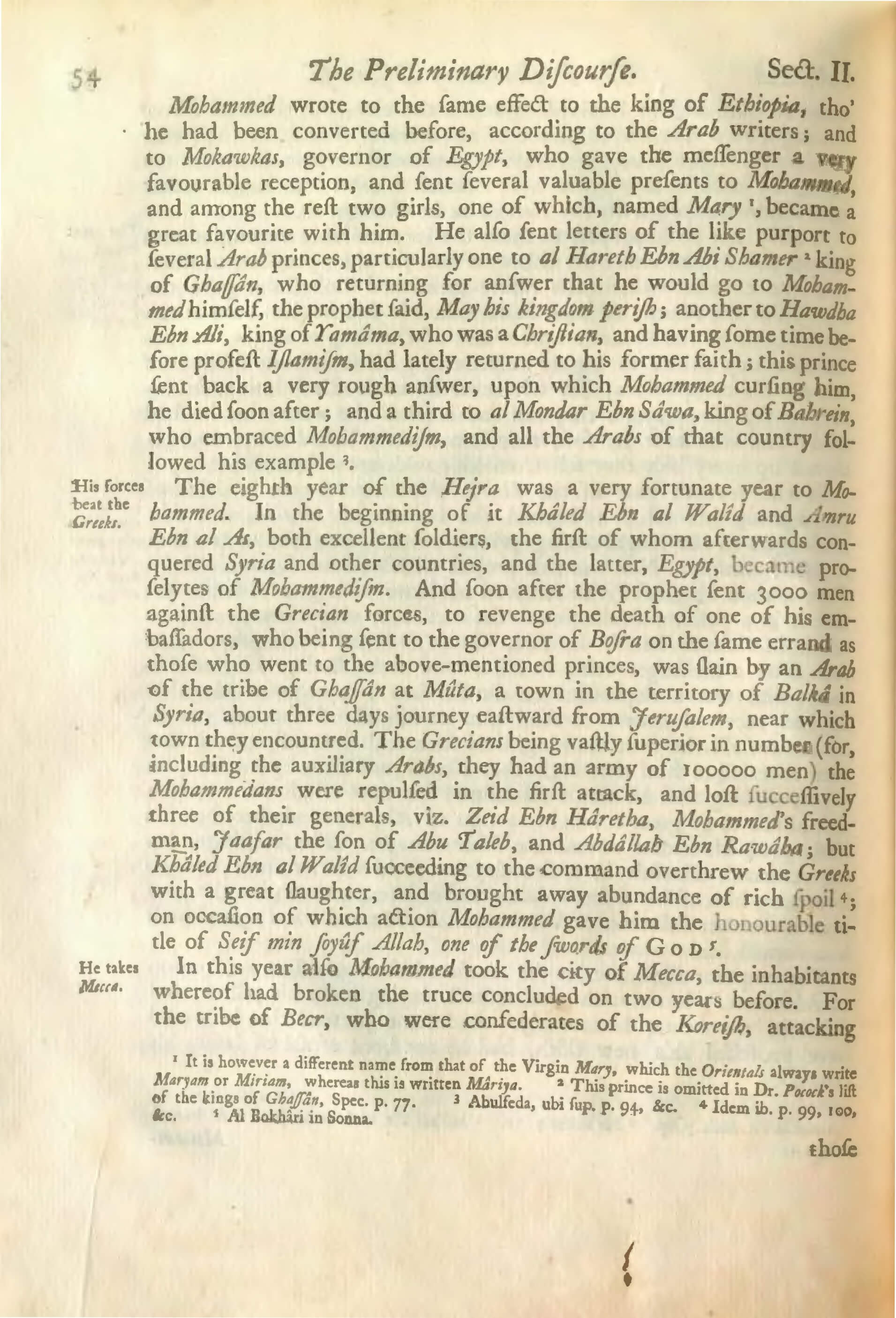George Sale, The Koran, commonly called the Alcoran of Mohammed, translated into English immediately from the original Arabic; with Explanatory Notes, taken from the most approved Commentators. To which is prefixed A Preliminary Discource (1734)
Mohammed wrote to the same effect to the king of Ethiopia, tho’ he had been converted before, according to the Arab writers; and to Mokawkas, governor of Egypt, who gave the messenger a very favourable reception, and sent several valuable presents to Mohammed, and among the rest two girls, one of which, named Mary 1, became a great favourite with him. He also sent letters of the like purport to several Arab princes, particularly one to al Hareth Ebn Abi Shamer 2 king of Ghassân, who returning for answer that he would go to Mohammed himself, the prophet said, May his kingdom perish; another to Hawdha Ebn Ali, king of Yamâma, who was a Christian, and having some time before profest Islamism, had lately returned to his former faith; this prince sent back a very rough answer, upon which Mohammed cursing him, he died soon after; and a third to al Mondar Ebn Sâwa, king of Bahrein, who embraced Mohammedism, and all the Arabs of that country followed his example 3.
His forces beat the Greeks.
The eighth year of the Hejra was a very fortunate year to Mohammed. In the beginning of it Khaled Ebn al Walîd and Amru Ebn al As, both excellent soldiers, the first of whom afterwards conquered Syria and other countries, and the latter, Egypt, became proselytes of Mohammedism. And soon after the prophet sent 3000 men against the Grecian forces, to revenge the death of one of his embassadors, who being sent to the governor of Bosra on the same errand as those who went to the above-mentioned princes, was slain by an Arab of the tribe of _Ghassân at Mûta, a town in the territory of Balkâ in Syria, about three days journey eastward from Jerusalem, near which town they encountred. The Grecians being vastly superior in number (for, including the auxiliary Arabs, they had an army of 100000 men) the Mohammedans were repulsed in the first attack, and lost successively three of their generals, viz. Zeid Ebn Hâretha, Mohammed’s freedman, Jaafar the son of Abu Taleb, and Abdâllah Ebn Rawâba; but Khâled Ebn al Walîd succeeding to the command overthrew the Greeks with a great slaughter, and brought away abundance of rich spoil 4; on occasion of which action Mohammed gave him the honourable title of Seif min soyûf Allah, one of the swords of God 5.
He takes Mecca.
In this year also Mohammed took the city of Mecca, the inhabitants whereof had broken the truce concluded on two years before. For the tribe of Becr, who were confederates of the Koreish, attacking
1 It is however a different name from that of the Virgin Mary, which the Orientals always write Maryam or Miriam, whereas this is written Mâriya.
2 This prince is omitted in Dr. Pocock’s list of the kings of Ghassân, Spec. p. 77.
3 Abulfeda, ubi sup. p. 94, &c.
4 Idem ib. p. 99, 100, &c.
5 Al Bokhâti in Sonna.
